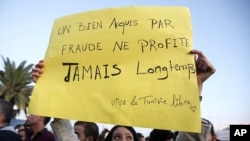Violence erupted in the Tunisian town of Sidi Bouzid, where popular protests first broke out in the Arab world last year, after a local party was disqualified for campaign violations in this week's elections.
At the same time, Rachid Ghannouchi, head of the Islamist Ennahda party, which won the election, insisted that his party would respect women's rights and Tunisia's pro-Western values.
On Friday, rioters clashed with security forces in the Tunisian town of Sidi Bouzid, over the outcome of an election that left a favorite son in fourth place.
Witnesses said supporters of the Popular List party, which lost seats in the election, tried to storm the provincial government headquarters. Thursday, protesters also set fire to an Ennahda party bureau and the mayor's office.
Khattar Abou Diab, who teaches political science at the University of Paris, said the election controversy, coupled with unrest in Sidi Bouzid, is a bad omen for the democratic process in Tunisia:
The Ennahda movement is beginning the transition on a sour note by falsely accusing a candidate of ties to the old regime, he said.
Ennahda party chief Rachid Ghannouchi told a press conference that Ennahda would uphold democratic principles. He said the Ennahda is heading in the direction of achieving a free and prosperous Tunisia where religious and social rights are respected.
The Ennahda party officially won a little more than 40 percent of the seats in the Constituent Assembly.
Observers like Abou Diab worry that Islamic movements in the region have yet to be tested for their tolerance pledges. He said these movements draw their strength from Islam, which has traditionally fueled a political force that opposes pro-Western values and is now, in his words, winning hands down.
Abou Diab said that the West could be in for a big disappointment over the results of the Arab Spring movement if Islamists use a strong political and social network to push an anti-secular, anti-Western agenda.




